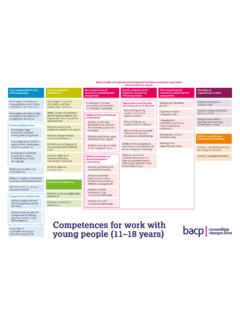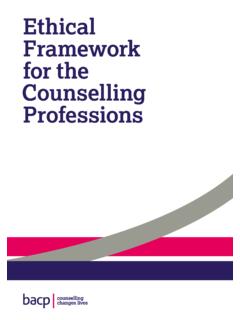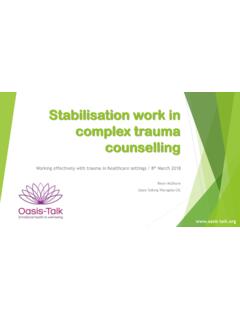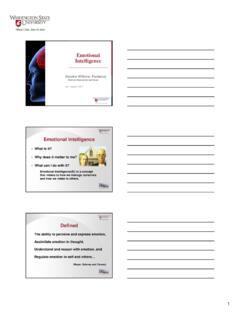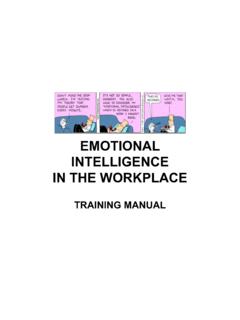Transcription of Competences for work with children - BACP
1 Professional/legal issues Engagement & communicationCore Competences for work with children and young peopleKnowledge of development in children and young people and of family development and transitionsAbility to work within a school contextAbility to promote emotional health in schoolsAbility to work within a voluntary and community ( third ) sector contextAbility to use self-help materials for a range of problemsAbility to use applied relaxationKnowledge and understanding of mental health problems in children , young people and adultsAbility to work within and across agenciesAbility to recognise and respond to concerns about child protectionAbility to work in a culturally competent mannerKnowledge of psychopharmacology in work with children and young peopleKnowledge of legal frameworks relating to working with children and young peopleKnowledge of the basic assumptions and principles of humanistic counsellingWorking with the whole personCapacity to balance therapeutic tasksIntegrating the counsellor s experience into the therapeutic relationshipWorking with complex relational issuesWorking in the organisational contextAbility to help children and young people make sense of experiences that are confusing and distressingAbility to use creative methods and resources to help children and young
2 People express, reflect upon, and make sense of their experiencesPlay in TherapyAbility to initiate therapeutic relationshipsApproaches to working with, and making sense of, emotionsAbility to maintain and develop therapeutic relationshipsAbility to engage and work with children /young people, parents and carersKnowledge of, and ability to operate within, professional and ethical guidelinesAbility to communicate with children and young people of differing ages, developmental level and backgroundKnowledge of, and ability to work with, issues of confidentiality, consent and capacityGeneric therapeutic competencesKnowledge of models of intervention, and their employment in practiceAbility to foster and maintain a good therapeutic alliance, and to grasp the client s perspective and world view Ability to work with the emotional content of the sessionAbility to manage endings and service transitionsAbility to work with groups of children , young people and/or parents/carersAbility to make use of measures (including monitoring of outcomes)
3 Ability to make use of supervisionAssessment Competences Ability to conduct a collaborative assessmentAbility to conduct a risk assessmentAbility to conduct a collaborative assessment with younger clients and their parents/carersBasic Competences for humanistic counselling with children and young peopleSpecific Competences for humanistic counselling with children and young peopleMetacompetences for humanistic counselling with children and young people Working in an organisational contextAbility to use additional therapeutic interventionsAbility to explain and demonstrate the rationale for humanistic approaches to therapyAbility to help children and young people to access and express emotionsAbility to help children and young people articulate emotionsAbility to help children and young people reflect on emotions and develop new understandingsAbility to experience and communicate empathyAbility to establish and agree a therapeutic focus/goalsAbility to experience and to communicate a fundamentally accepting attitude to children and young peopleAbility to develop a contract for the therapeutic workAbility to maintain authenticity in the counselling relationshipAbility to conclude counselling relationshipsCompetences for work with children and young people (4 18 years) Copyright 2019 British Association for Counselling and PsychotherapyCompetences for work with children and young people (4 18 years) Core Competences for work with children and young people1 Back to map1.
4 Knowledge of development in children and youngpeople and of family development and transitions Knowledge of child and adolescent ability to draw on knowledge of the needs of children and young peoplein relation to their physical, social, cognitive, emotional and psychosexualdevelopment ( , need for attachment relationships, education, appropriatepatterns of diet, sleep and exercise) ability to draw on knowledge of normal child and adolescent developmentand its impact on ability to draw on knowledge of theories of child and adolescentdevelopment including: physical development (including brain development in thefirst years of life (and the interaction of this developmentwith affective experiences and deprivation); sensory andpsychomotor development) cognitive development ( intelligence , language and symbolisation,the Piagetian model, mentalisation, awareness of self and others) social and emotional development ( emotional intelligence ,interpersonal competence, identity and moral development atadolescence, compassion and self-management, the impact ofthe social context)
5 Ability to draw on knowledge of age-appropriate andproblematic ability to draw on concepts of developmental stages, includingphysical, affective and interpersonal, cognitive, language, social andpsychosexual ability to draw on knowledge of the effects of developmentaltransitions toilet training and onset of ability to draw on knowledge of the interaction between differentaspects of a child/young person s development and between individual andcontextual factors such as people, culture and circumstances Core Competences for work with children and young people Copyright 2019 British Association for Counselling and PsychotherapyCompetences for work with children and young people (4 18 years) Core Competences for work with children and young people2 Back to Knowledge of the care environment and its interaction with child and adolescent ability to draw on knowledge of attachment theory and its implications and adolescent development, via the concept of internal workingmodels and the links between attachment status ( , secure vs.)
6 Insecure),cognitive, emotional and social development of parent/carer-child, sibling and peer development of emotional wellbeing, self-regulation, mental health andmental health development of resilience ( , the ability to cope with stressful andadverse experiences, including difficult interpersonal experiences) and young people who are adopted or looked afterInfluence of ability to draw on knowledge of the impact of the pre-natal and peri-natalenvironment on child and adolescent ability to draw on knowledge of parenting ability to draw on knowledge that the parent/carer s communication, interactionand stimulation of their child interacts with the child s development, attainment anddeveloping mental ability to draw on knowledge that effective forms of parent/carer-engagementchange as children and young people ability to draw on knowledge that the balance of influence from parents/carers,peers, authority figures and other alters as the child/young person ability to draw on knowledge of factors that make it harder for parents/carersto offer consistent or positive parenting (.
7 emotional and cognitive immaturity,mental health difficulties (particularly substance misuse), loss, abuse, socialdisadvantage and adversity or negative experience of parenting in their own lives) ability to draw on knowledge of the positive effects of parent/carer support and adolescent development Copyright 2019 British Association for Counselling and PsychotherapyCompetences for work with children and young people (4 18 years) Core Competences for work with children and young people3 Back to mapPlay ability to draw on knowledge of the importance of play for all aspects of social,cognitive and emotional ability to assess whether a child or adolescent s level and type of play is broadlynormative for their age ability to draw on knowledge about effective ways of stimulating play activity inchildren and young people ( , by providing them with appropriate materials, andby descriptive commenting)
8 Ability to draw on knowledge of the value of child/young person-led rather thanadult-led play ability to draw on knowledge of the positive and negative impacts of electronicmedia on child and adolescent Family ability to draw on knowledge that the child/young person and their family needsto be viewed in a number of different contexts family and other significant social and community professional network(s) involved with cultural socio-political ability to draw on knowledge of different family structures and ability to draw on knowledge of the family lifecycle and the ways this variesacross social contexts and cultures, so as to understand the developmental tasks ofspecific ability to draw on knowledge of the potential impact of significant familytransitions both on the child/young person and their family ( , birth of new familymember, starting school, bereavement, moving home, divorce, separation,step-families) ability to draw on knowledge of the potential impact on families of socialadversity (loss, abuse, social change, socio-economic disadvantage, healthinequality)
9 Copyright 2019 British Association for Counselling and PsychotherapyCompetences for work with children and young people (4 18 years) Core Competences for work with children and young people4 Back to Knowledge of the external environment and its interaction with child/adolescent development ability to draw on knowledge of the challenges and positive opportunities theexternal environment can present for children and young ability to draw on knowledge of the impact of the school or college statutory requirement to attend school or college and the subsequentdemands of the institution ( , having to wear a school uniform, andenforced attendance in particular curriculum areas) and the impact on thechild/young person as a result of these limits to effects of summative or continuous assessment through modular work orexaminations and the impact this can have on emotional sense of achievement in acquiring new knowledge and ability to draw on knowledge of the challenges of school transitions in early andprimary school years impact of transition and loss on the sense of powerlessness that the child may be experiencing in theface of external difficulties that the child may experience in adapting to change( anxiety, fear of the unknown)
10 Ability to draw on knowledge of the challenges of a becoming a working-agedadult following attendance at school and unfamiliar levels of relationships with adults as workforce peers or increasing sense of need to behave in an adult and professional implications of forthcoming employment or ability to draw on knowledge of the impact of peer relationships or exclusion in various peer groupings and in risk-taking behaviours, such as smoking, sniffing, alcohol,drugs, in antisocial behaviours, such as joyriding, shoplifting,vandalism, intimidation of experience of peer support and a growing sense of individual ability to draw on knowledge of social development and how children learn todevelop relationships and peer groups, and the impact this can have. Copyright 2019 British Association for Counselling and PsychotherapyCompetences for work with children and young people (4 18 years) Core Competences for work with children and young people5 Back to map2.

